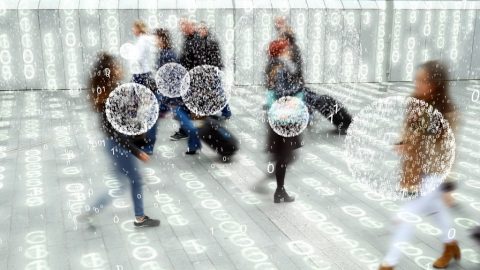We were reading way too little in high school. As a result, I sometimes find myself reading books that others read, discussed, and understood at the age of 16 at school. Recently I was reading Friedrich Dürrenmatt’s “The Physicists”, one of the best-known plays of German literature. Written in the shadow of a mushroom cloud, it deals with the responsibility of science. Can science be good or bad per se? Can the human race handle scientific discoveries? Are scientists responsible for the consequences of their actions? Big issues that keep coming up today as well, if we think about big data.
Big Data contains a lot of good. Just think of early detection of cancer. Algorithms are able to calculate the probability of a person suffering from cancer from his online search queries. If someone googles certain symptoms such as pain or fatigue, the algorithm’s alarm bells are ringing. Isn’t that a great technology that is capable of providing someone with the chance of a therapy due to early warning at a stage where the chances of a complete recovery are significant?
Big Data gives rise to a lot of controversy. Just think of social scoring, for example. Your friends, your media consumption, your daily habits, your sports activities, your opinions, everything you do is recorded, evaluated, and ultimately channelled into a rating. – A number that expresses your value and your opportunities as human being. This is a world that Marc Elsberg described in his dystopian thriller “Zero – They Know Everything You Do” a few years ago. In 2014, the Chinese State Council decided to introduce such a system by 2020. The Social Score will then be crucial for access to credit, university admission, jobs in the public sector, or the chance to travel abroad.
In the annex to his book, Dürrenmatt summed up his drama theory in “21 Points to the Physicists”. They are:
- I don’t start out with a thesis but with a story.
- If you start out with a story you must think it through to its conclusion.
- A story has been thought out to its conclusion when it has taken its worst possible turn.
- The worst possible turn is not foreseeable. It occurs by accident.
- The art of the playwright consists in employing, to the most effective degree possible, accident within the action.
- The carriers of dramatic action are human beings.
- Accident in dramatic action consists in when and where who happens to meet whom.
- The more human beings proceed by plan the more effectively they may be hit by accident.
- Human beings proceeding by plan wish to reach a specific goal. They are most severely hit by accident when through it they reach the opposite of their goal: the very thing they feared, they sought to avoid (i.e. Oedipus).
- Such a story, though it is grotesque, is not absurd (contrary to meaning).
- It is paradoxical.
- Playwrights, no less than logicians, are unable to avoid the paradoxical.
- Physicists, no less than logicians, are unable to avoid the paradoxical.
- A drama about physicists must be paradoxical.
- It cannot have as its goal the content of physics, but its effect.
- The content of physics is the concern of physicists, its effect the concern of all men.
- What concerns everyone can only be resolved by everyone.
- Each attempt of an individual to resolve for himself what is the concern of everyone is doomed to fail.
- Within the paradoxical appears reality.
- He who confronts the paradoxical exposes himself to reality.
- Drama can dupe the spectator into exposing himself to reality but cannot compel him to withstand it or even to master it.
I do not have an answer to the question of whether Big Data is good or bad, but I do know that it is reality and that we have to face this reality.
Legal note:
Prognoses are no reliable indicator for future performance.
Legal disclaimer
This document is an advertisement. Unless indicated otherwise, source: Erste Asset Management GmbH. The language of communication of the sales offices is German and the languages of communication of the Management Company also include English.
The prospectus for UCITS funds (including any amendments) is prepared and published in accordance with the provisions of the InvFG 2011 as amended. Information for Investors pursuant to § 21 AIFMG is prepared for the alternative investment funds (AIF) administered by Erste Asset Management GmbH pursuant to the provisions of the AIFMG in conjunction with the InvFG 2011.
The currently valid versions of the prospectus, the Information for Investors pursuant to § 21 AIFMG, and the key information document can be found on the website www.erste-am.com under “Mandatory publications” and can be obtained free of charge by interested investors at the offices of the Management Company and at the offices of the depositary bank. The exact date of the most recent publication of the prospectus, the languages in which the fund prospectus or the Information for Investors pursuant to Art 21 AIFMG and the key information document are available, and any other locations where the documents can be obtained are indicated on the website www.erste-am.com. A summary of the investor rights is available in German and English on the website www.erste-am.com/investor-rights and can also be obtained from the Management Company.
The Management Company can decide to suspend the provisions it has taken for the sale of unit certificates in other countries in accordance with the regulatory requirements.
Note: You are about to purchase a product that may be difficult to understand. We recommend that you read the indicated fund documents before making an investment decision. In addition to the locations listed above, you can obtain these documents free of charge at the offices of the referring Sparkassen bank and the offices of Erste Bank der oesterreichischen Sparkassen AG. You can also access these documents electronically at www.erste-am.com.
Our analyses and conclusions are general in nature and do not take into account the individual characteristics of our investors in terms of earnings, taxation, experience and knowledge, investment objective, financial position, capacity for loss, and risk tolerance. Past performance is not a reliable indicator of the future performance of a fund.
Please note: Investments in securities entail risks in addition to the opportunities presented here. The value of units and their earnings can rise and fall. Changes in exchange rates can also have a positive or negative effect on the value of an investment. For this reason, you may receive less than your originally invested amount when you redeem your units. Persons who are interested in purchasing units in investment funds are advised to read the current fund prospectus(es) and the Information for Investors pursuant to § 21 AIFMG, especially the risk notices they contain, before making an investment decision. If the fund currency is different than the investor’s home currency, changes in the relevant exchange rate can positively or negatively influence the value of the investment and the amount of the costs associated with the fund in the home currency.
We are not permitted to directly or indirectly offer, sell, transfer, or deliver this financial product to natural or legal persons whose place of residence or domicile is located in a country where this is legally prohibited. In this case, we may not provide any product information, either.
Please consult the corresponding information in the fund prospectus and the Information for Investors pursuant to § 21 AIFMG for restrictions on the sale of the fund to American or Russian citizens.
It is expressly noted that this communication does not provide any investment recommendations, but only expresses our current market assessment. Thus, this communication is not a substitute for investment advice.
This document does not represent a sales activity of the Management Company and therefore may not be construed as an offer for the purchase or sale of financial or investment instruments.
Erste Asset Management GmbH is affiliated with the Erste Bank and austrian Sparkassen banks.
Please also read the “Information about us and our securities services” published by your bank.


